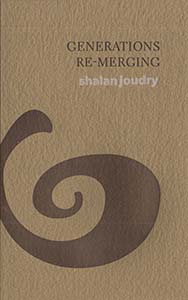Shalan Joudry artfully explores the poetic relationships between generations. Her poetry charts Mi’kmaw ancestry, identity, parenthood, and traditional teachings in her debut collection, Generations Re-merging.
In “Prologue,” she writes, “Each generation must make their own / journey through a thick terrain. / How ever we got lost along the way, let us / rejoice in the healing steps that follow.” For Joudry, poetry is a mapmaker to one’s journey and an essential step in healing. In several poems, Joudry writes in her mother Mi’kmaq tongue, including “sun’l: cranberries,” “kesaul: I love you,” “kesik: winter,” “sipu: river,” “mimikejk: butterflies,” “wela’lioq: thank you (all),” and “kitpu: eagle.” She works between the languages, weaving English and Mi’kmaq to create a poetic relationship between fragments—the intermingling charts new terrain.
Throughout the text, Joudry’s narrator returns to her own healing process. In “Eastbound by Train,” she writes, “did i share too much you wonder / my poetry so private / my medicines too dry now to show others / without crumbling / this is npisum.” Joudry offers readers footnotes for clarification—as npisum is the Mi’kmaq word for “my medicine.”
While she draws as much from the landscape as her elders, Joudry’s inner wisdom resounds in her work. Given her role as a storyteller, her poems have a specific vernacular that embraces life, loss and love, endurance and beauty, social and ecological shifts. In “The View,” she writes of the ego leaving the body, “so that something takes its place / at that point / that stoppage / the land challenges us to shift / to see some other dimension / the world’s other truths.”
True to poetry’s precision, some of the shortest, most simple poems resonate the deepest. Early in the book, almost acting as a framework to the collection, “The Known World” is a poem that speaks to an estranged relationship to the earth, and how far we’ve grown distant from seeking its truths. Joudry writes, “how can something known / become unknown / in so little time.”
In “Medicine Walk,” Joudry meditates on her journey, taking readers along the river, across stones, “for those yet to come / to discover themselves / our offerings left beaches / like petroglyphs engraved.” Beyond the architecture of time and space, readers arrive at a union with an almost whispered promise: “we will learn the languages of our territory / spread seeds / be each other’s borrowed land.”
Poetry has the ability to acknowledge and gracefully cradle trauma. While Generations Re-merging honours and recognizes a painful transgenerational history, these poems are personal and political, with many connecting to Mi’kmaw-colonial history. As a collection, Generations Re-merging is medicinal—healing to both author and reader, and an offering for many generations to come.














